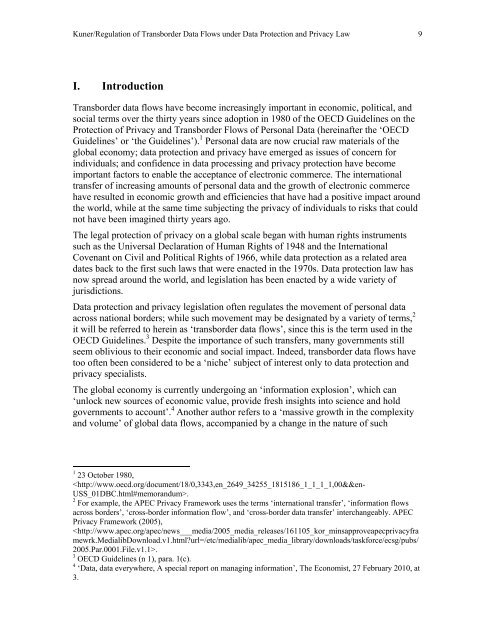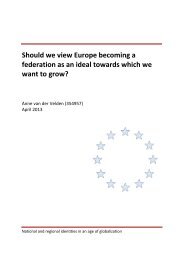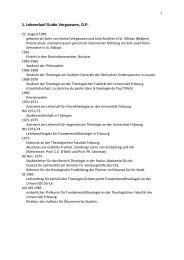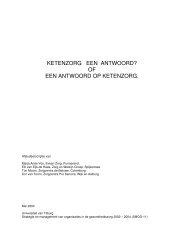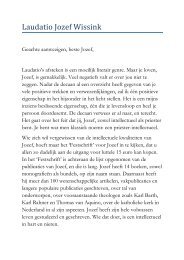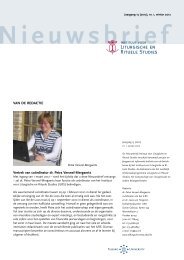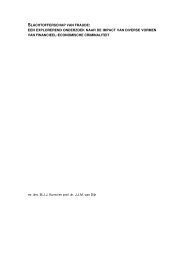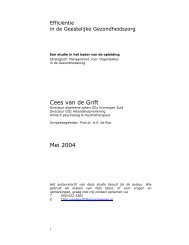Regulation of Transborder Data Flows under ... - Tilburg University
Regulation of Transborder Data Flows under ... - Tilburg University
Regulation of Transborder Data Flows under ... - Tilburg University
Create successful ePaper yourself
Turn your PDF publications into a flip-book with our unique Google optimized e-Paper software.
Kuner/<strong>Regulation</strong> <strong>of</strong> <strong>Transborder</strong> <strong>Data</strong> <strong>Flows</strong> <strong>under</strong> <strong>Data</strong> Protection and Privacy Law 9<br />
I. Introduction<br />
<strong>Transborder</strong> data flows have become increasingly important in economic, political, and<br />
social terms over the thirty years since adoption in 1980 <strong>of</strong> the OECD Guidelines on the<br />
Protection <strong>of</strong> Privacy and <strong>Transborder</strong> <strong>Flows</strong> <strong>of</strong> Personal <strong>Data</strong> (hereinafter the ‘OECD<br />
Guidelines’ or ‘the Guidelines’). 1 Personal data are now crucial raw materials <strong>of</strong> the<br />
global economy; data protection and privacy have emerged as issues <strong>of</strong> concern for<br />
individuals; and confidence in data processing and privacy protection have become<br />
important factors to enable the acceptance <strong>of</strong> electronic commerce. The international<br />
transfer <strong>of</strong> increasing amounts <strong>of</strong> personal data and the growth <strong>of</strong> electronic commerce<br />
have resulted in economic growth and efficiencies that have had a positive impact around<br />
the world, while at the same time subjecting the privacy <strong>of</strong> individuals to risks that could<br />
not have been imagined thirty years ago.<br />
The legal protection <strong>of</strong> privacy on a global scale began with human rights instruments<br />
such as the Universal Declaration <strong>of</strong> Human Rights <strong>of</strong> 1948 and the International<br />
Covenant on Civil and Political Rights <strong>of</strong> 1966, while data protection as a related area<br />
dates back to the first such laws that were enacted in the 1970s. <strong>Data</strong> protection law has<br />
now spread around the world, and legislation has been enacted by a wide variety <strong>of</strong><br />
jurisdictions.<br />
<strong>Data</strong> protection and privacy legislation <strong>of</strong>ten regulates the movement <strong>of</strong> personal data<br />
across national borders; while such movement may be designated by a variety <strong>of</strong> terms, 2<br />
it will be referred to herein as ‘transborder data flows’, since this is the term used in the<br />
OECD Guidelines. 3 Despite the importance <strong>of</strong> such transfers, many governments still<br />
seem oblivious to their economic and social impact. Indeed, transborder data flows have<br />
too <strong>of</strong>ten been considered to be a ‘niche’ subject <strong>of</strong> interest only to data protection and<br />
privacy specialists.<br />
The global economy is currently <strong>under</strong>going an ‘information explosion’, which can<br />
‘unlock new sources <strong>of</strong> economic value, provide fresh insights into science and hold<br />
governments to account’. 4 Another author refers to a ‘massive growth in the complexity<br />
and volume’ <strong>of</strong> global data flows, accompanied by a change in the nature <strong>of</strong> such<br />
1<br />
23 October 1980,<br />
.<br />
2<br />
For example, the APEC Privacy Framework uses the terms ‘international transfer’, ‘information flows<br />
across borders’, ‘cross-border information flow’, and ‘cross-border data transfer’ interchangeably. APEC<br />
Privacy Framework (2005),<br />
.<br />
3<br />
OECD Guidelines (n 1), para. 1(c).<br />
4<br />
‘<strong>Data</strong>, data everywhere, A special report on managing information’, The Economist, 27 February 2010, at<br />
3.


